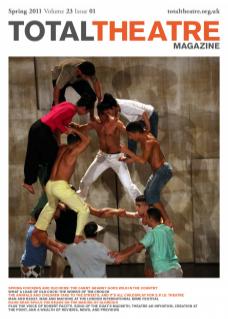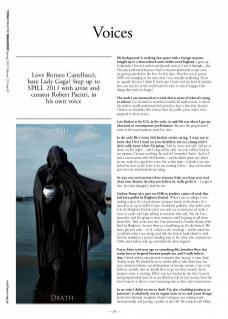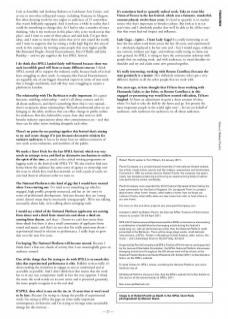My background: a working class queer with a foreign surname bought up in a then redneck town within rural England. I grew up in Ipswich; I live in London and Ipswich now so I saw it through – but I became politicised because I had to become politicised or just carry on getting smacked in the face. At that time, Thatcher was in power; AIDS was emerging at the same time I was sexually awakening. I have an ‘agenda’ because I think if you’ve got a brain and any level of analysis, how can you live in this world and not want to sort of engage with things that need to change?
The work I am interested in is work that is aware of what it’s trying to achieve. I’ve invested in work that would call itself activist, or where the makers would understand their practices have a function, because I believe we shouldn’t take money from the public purse unless we’re prepared to be in service.
Lois Keidan at the ICA, in the early- to mid-90s was where I got my education in contemporary performance. Because she programmed some of the most hardcore work I’ve seen.
In the early 90s I wrote Neil Bartlett a letter saying, ‘I want you to know that I feel I stand on your shoulders, but as a young artist I don’t really know where I’m going.’ And he wrote and said, ‘call me at home on this night’... and I rang and he said, ‘can you call me back in ten minutes, I’m just watching the end of Coronation Street’. And so I had a conversation with Neil Bartlett – and he didn’t know me, didn’t see my work for a good few years, but at that time – I think it was just before he went to the Lyric so he was making Gloria – that conversation gave me real wind beneath my wings.
So, just one conversation where someone helps you keep your cool, chase your dreams, do what you believe in, really go for it – I support that. Just that changed a load for me.
Lindsay Kemp once gave me £500 to produce a piece of work that had been pulled by Brighton Festival. When I was at college, I was making a piece for a local theatre company based on the diaries of a man that set up an AIDS Centre. Somebody pulled it, they didn’t want it in the Brighton Festival and it was only my second piece of work. I went in a pub, and I got talking to someone who said, ‘Ah, ok, I’m a journalist, and I’m going to meet someone and I’m going to tell them about this.’ And so the next day I was presented to Lindsay Kemp at his hotel in Brighton – he was there as a headlining act for the festival. We had a gin and tonic – at 11 o’clock in the morning! – and he asked me to tell him what I was doing, and why the festival hadn’t liked it. And then he nodded at a person standing next to his chair, who counted out £500, and Lindsay said, ‘go and make the show happen’.
Tracey Emin said years ago on something like Jonathon Ross that artists have to be good business people too, and I really believe that. I think within experimental territories that ‘money’ is some kind of dirty word. We should be savvy and be able to talk about how our own valuation informs our development of income streams. I am a real believer, actually, that art should have to go out there smartly. Savvy, business sense, is exciting. SPILL isn’t just funded by the Arts Council, and going forward none of us can afford to rely on just income from the Arts Council, so this is a very interesting time to have that conversation.
As an artist I didn’t set out to think ‘I’m also a budding producer or presenter’; it absolutely was an urgent tactic to try and create change. In the late 90s/early noughties Pacitti Company was making work internationally, and gaining a profile in the UK. We worked with Helen Cole at Arnolfini and Anthony Roberts at Colchester Arts Centre, and at one or two other influential venues, including Tramway in Glasgow. But often showing work for two nights to audiences of 15 somewhere that wasn’t brilliantly equipped. And it took me a while to realise that I could do something to change that. So I had to take a number of years thinking, ‘why is my work not in this place, why is my work not in that place’, and I went to some of these places and said look, I’ve got these ideas, and I want to invite these artists that we’ve met round the world, and I want to augment that by raising a really high flag for this area of work in this country by inviting some people that were higher profile like Raimund Hoghe, Forced Entertainment, Kira O’Reilly and Julia Bardsley – and we put together the first SPILL festival.
I do think that SPILL landed fairly well-formed because there was such incredible good will from so many different sources. I think SPILL started off to support the industry, really, because loads of us had been struggling to show work. A company like Forced Entertainment are arguably one of our biggest theatrical exports in terms of new work that is bought worldwide, and still they were struggling to sustain a platform in London.
The relationship with The Barbican is really important. It’s a great fantastic, enabling, relationship – and it’s all about context, and it’s all about audiences, and there’s something there that is very mutual… there’s reciprocity about relationships. We both understand what we are bringing to the table, and how that can effect change in public realms for audiences. But also, behind the scenes, how that starts to shift broader industry expectations about who commissioners are – and that these can be other artists working alongside each other.
There’s no point for me putting together this festival that’s aiming to try and create change if it just becomes decorative trinkets for exclusive audiences. It has to be about how we address territories of new work across industries, and members of the public.
We made a Tarot Deck for the last SPILL festival, which was very much an attempt to try and find an alternative mechanism to archive the spirit of the time, as much as the critical writing programme or logging work in the festival with SPILL TV. We also tried to find new forms where the audience has some sense of agency or ownership over the ways in which they read that material, so with a pack of cards, we can read them in whatever order we want to.
The national Platform is the kind of gig that I would have wanted when I was starting out. I’ve tried to set something up which is engaged, high profile, properly resourced, and has an ‘on’ story in terms of professional development. And just because they are ‘young artists’ doesn’t mean they’re necessarily ‘young people’. We’re not talking necessarily about kids, we’re talking about emerging work.
I would say a third of the National Platform applicants are coming from dance and a third from visual arts and about a third are coming from theatre, and then – I know we can’t have more than three-thirds but there is also a small community of applicants from sound and music, and that’s an area that I’m really passionate about – experimental sound in relation to performance. I really hope to grow that over the next few years.
I’m hoping the National Platform will become annual. Because I think that’s a bite-size chunk of activity that I can meaningfully grow an audience around.
One of the things that I’m trying to do with SPILL is to smash this idea that experimental performance is elite. Bullshit to that really, it’s about making the invitation to engage as easy to understand and as accessible as possible. And I don’t think that that means that the work has to in any way compromise itself; in fact the very opposite. I think the more the work stands on its own terms and is presented genuinely, the more people recognise it as the real deal.
If SPILL does what it says on the tin, in 15 years time it won’t need to be here. Because I’m trying to change the profile of experimental work; I’m trying to fill in the gaps on some really important contemporary art histories and I’m trying to leverage some sustainable change for the territory…
It’s sometimes hard to quantify radical work. Take an event like Vision of Excess in the last festival, which was a fantastic, wonderful, countercultural, twelve-hour event. It’s hard to quantify it, in market terms; why that’s important to broader culture. But look at it in ten year’s time and I absolutely predict that we’ll be able to list all the ways that that event had real impact and influence.
Lady Gaga – (spits) – I hate Lady Gaga! It is really interesting to see how she has taken work from across the last 30 years, and repositioned it – absolutely deployed it for her own end – but I would argue, without any context, without any logic, and without really trying to claim any new ground. So SPILL is trying to have the conversation sideways with people that are making work, and with audiences, to stand shoulder-toshoulder and try and claim some new ground together.
It’s really interesting, working with Romeo Castellucci because the man genuinely is a master. He’s definitely someone who’s got a very different rhythm to all the other people that we work with.
Five years ago, to have thought that I’d have been working with Diamanda Galás, or Jan Fabre, or Romeo Castellucci, in this engaged co-presenting way would have seemed ridiculous, I’d have laughed. It’s been an adjustment in quite a short amount of time, where I’ve had to take the bull by the horns and go ‘lets present the most important people in the world right now’ – for me on behalf of audiences, with audiences for audiences, its all about audiences.
Robert Pacitti spoke to Tom Wilson, 24 January 2011.
Pacitti Company is a London-based ensemble of international theatre-makers, live artists, visual artists, sound- and film-makers, researchers and technicians. Convened in 1991 by artistic director Robert Pacitti, the company has spent nearly two decades producing and touring an award-winning body of radical new performance works, worldwide.
Pacitti Company were awarded the 2012 Cultural Olympiad Artists Taking the Lead commission for the East of England. On Landguard Point is a project about home: what ‘home’ means, what makes a home, how we forge our notions of home, what shifts when we view home from afar, or host others in our own home.
For more on this and other projects see www.pacitticompany.com
Initiated in 2007 by Robert Pacitti, the biennial SPILL Festival of Performance returns to London 18–24 April 2011.
SPILL 2011 features six world premieres and four SPILL commissions, showcasing a combination of established and emerging artists during the festival’s week-long run, with all performances (other than the National Platform work) presented at the Barbican. There will be large stage works, small delicate interventions, a SPILL Thinker in Residence (Oreet Ashery), talks, salons, film, music – and a backstage feast on Good Friday, 22 April.
Organised by Pacitti Company and SPILL Festival of Performance, and supported by the Jerwood Charitable Foundation, the SPILL National Platform showcases emerging artists from throughout the UK whose work will be shown at the National Theatre Studio over Easter Weekend, 23–24 April 2011, further details to follow via the SPILL website.
To book tickets for SPILL shows, excluding the National Platform, see www. barbican.org.uk
All National Platform shows are free. See the SPILL website for further details on this and on all the shows/events at SPILL 2011.


